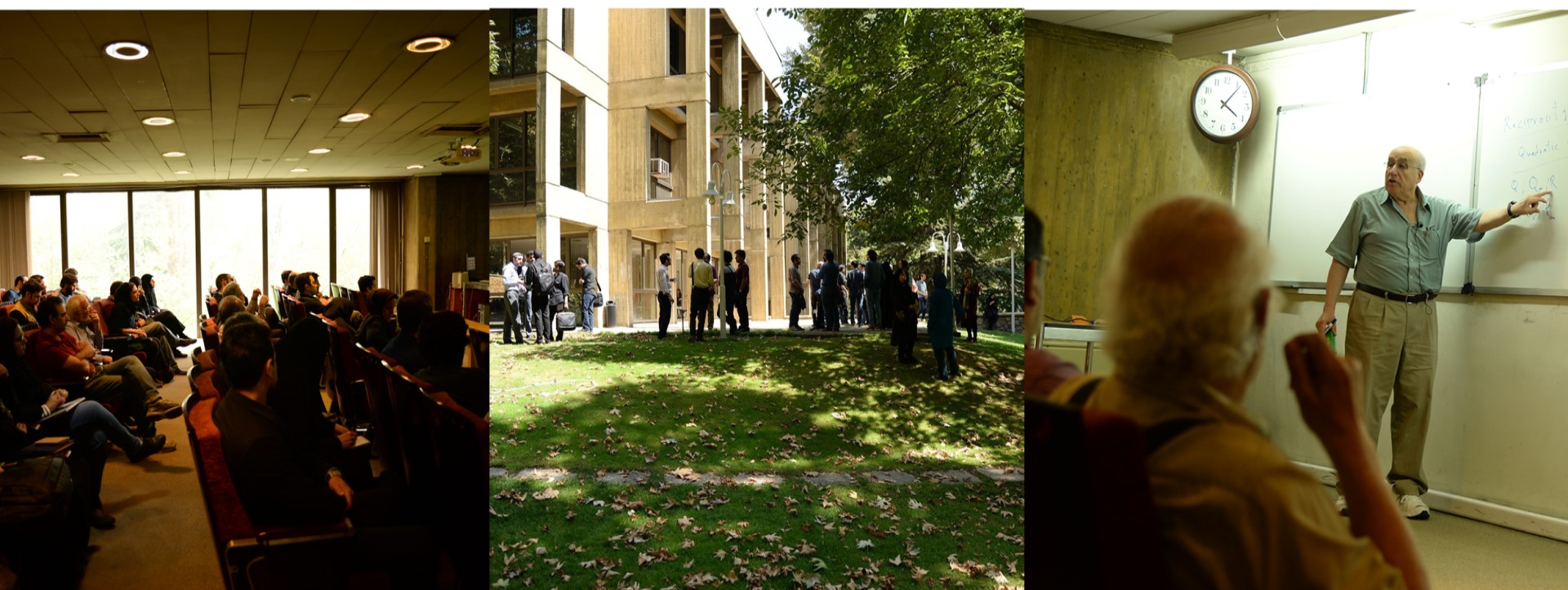
FGC-HRI-IPM Joint Number Theory Seminar

When: Wednesdays
Where: Zoom
Meeting ID: 85613860958
Seminar mailing list: google group
Talks
Speaker: Olga Lukina
Title: Weyl groups in Cantor dynamics
Abstract: Arboreal representations of absolute Galois groups of number fields are given by profinite groups of automorphisms of regular
rooted trees, with the geometry of the tree determined by a polynomial which defines such a representation. Thus arboreal
representations give rise to dynamical systems on a Cantor set, and allow to apply the methods of topological dynamics to
study problems in number theory. In this talk we consider the conjecture of Boston and Jones, which states that the images
of Frobenius elements under arboreal representations have a certain cycle structure. To study this conjecture, we borrow from
the Lie group theory the concepts of maximal tori and Weyl groups, and introduce maximal tori and Weyl groups in the profinite
setting. We then use this new technique to give a partial answer to the conjecture by Boston and Jones in the case when an arboreal
representations is defined by a post-critically finite quadratic polynomial over a number field. Based on a joint work with Maria Isabel Cortez.
Date: June 14, 2023
Video link
Passcode: 37*ta2if
Speaker: Carlo Pagano, Concordia University Montreal
Title: Abelian arboreal representations
Abstract: I will present joint work with Andrea Ferraguti which makes progress on a conjecture of Andrews and Petsche that
classifies abelian dynamical Galois groups over number fields, in the unicritical case. I will explain how to reduce the conjecture
to the post-critically finite case and the key tools to handle all unicritical PCF with periodic critical orbit over
any number field and all PCF over quadratic number fields. Along the way I will present an earlier rigidity result
of ours on the maximal closed subgroup of the automorphism group of a binary rooted tree, which offered us with the
main input to translate the commutativity of the Galois image into diophantine equations. I will also overview
progress on the tightly related problem of lower bounding arboreal degrees.
Date: May 31, 2023
Slides
Video link
Passcode: m5RS+P9W
Speaker: Cristiana Bertolin
Title: Periods of 1-motives and their polynomials relations
Abstract: The integration of differential forms furnishes an isomorphism between
the De Rham and the Hodge realizations of a 1-motive M. The coefficients of the matrix
representing this isomorphism are the so-called "periods" of M. In the semi-elliptic
case (i.e. the underlying extension of the 1-motive is an extension of an elliptic
curve by the multiplicative group), we compute explicitly these periods.
If the 1-motive M is defined over an algebraically closed field,
Grothendieck's conjecture asserts that the transcendence degree of
the field generated by the periods is equal to the dimension of the motivic
Galois group of M. If we denote by I the ideal generated by the polynomial
relations between the periods, we have that "the numbers of periods of M minus
the rank of the ideal I is equal to the dimension of the motivic Galois group of M",
that is a decrease in the dimension of the motivic Galois group is equivalent to
an increase of the rank of the ideal I. We list the geometrical phenomena which
imply the decrease in the dimension of the motivic Galois group and in each case
we compute the polynomials which generate the corresponding ideal I.
Date: May 17, 2023
Slides
Video link
Passcode: $df6.L*J
Speaker: Rahul Gupta, Harish-Chandra Research Institute
Title: Tame class field theory
Abstract: As a part of global class field theory, we construct a reciprocity map
that describes the unramified (resp. tame) étale fundamental group as a pro-completion of a
suitable idele class group (resp. tame idele class group) for smooth curves over finite fields.
These results were extended to higher-dimensional smooth varieties over finite fields by Kato-Saito
(unramified case, in 1986) and Schmidt-Spiess (tame case, in 2000). We begin the talk by recalling these results.
The main focus of the talk is to work with smooth varieties over local fields. The class field theory over local fields
is not as nice as that over finite fields. We discuss results in the unramified class field theory over local fields
achieved in the period 1981–2015 by various mathematicians (Bloch, Saito, Jennsen, Forre, etc.). We then move to the main
topic of the talk which is the tame class field theory over local fields and prove that the results in the tame case are similar
to that in the case of unramified class field theory.
This talk will be based on a joint work with A. Krishna and J. Rathore.
Date: May 3, 2023
Video link
Passcode: 1jdC6t&w
Speaker: Asgar Jamneshan, Koc University
Title: On inverse theorems and conjectures in ergodic theory and additive combinatorics
Abstract: I will provide a non-technical overview of some interactions between ergodic
theory and additive combinatorics. The focus will be on inverse theorems and conjectures for the
Gowers uniformity norms for finite abelian groups in additive combinatorics and their counterparts for
the Host-Kra-Gowers uniformity seminorms for abelian measure-preserving systems in ergodic theory.
Date: April 19, 2023
Video link
Passcode: 5.?44?LT
Speaker: Alia Hamieh
Title: Moments of L-functions and Mean Values of Long Dirichlet Polynomials
Abstract: Establishing asymptotic formulae for moments of L-functions is a central theme in analytic
number theory. This topic is related to various non-vanishing conjectures and and the generalized
Lindelöf Hypothesis. A major breakthrough in analytic number theory occurred in 1998 when Keating and Snaith
established a conjectural formula for moments of the Riemann zeta function using ideas from random matrix theory.
The methods of Keating and Snaith led to similar conjectures for moments of many families of L-functions.
These conjectures have become a driving force in this field which has witnessed substantial progress
in the last two decades. In this talk, I will review the history of this subject and
survey some recent results. I will also discuss recent joint work with Nathan Ng on
the mean values of long Dirichlet polynomials which could be used to model moments of the zeta function.
Date: April 5, 2023
Video link
Passcode: %v?5DHG6
Speaker: Ilker Inam, Bilecik Üniversitesi
Title: Fast computation of half-integral weight modular forms
Abstract: Modular forms continue to attract attention for decades with many different
application areas. To study statistical properties of modular forms, including for instance
Sato-Tate like problems, it is essential to be able to compute a large number of Fourier
coefficients. In this talk, we will show that this can be achieved in level 4 for a
large range of half-integral weights by making use of one of three explicit bases,
the elements of which can be calculated via fast power series operations.
Date: March 15, 2023
Video link
Passcode: Z#%8V=cf